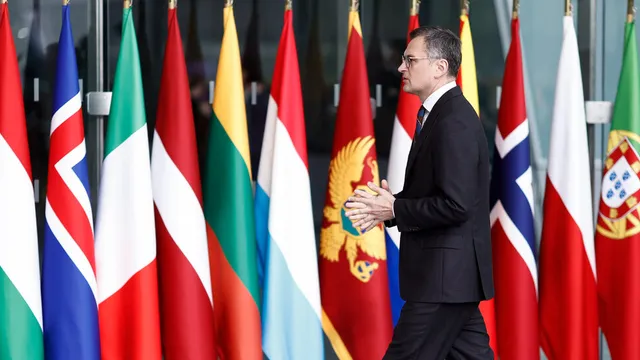
Ukraine’s Kuleba rallies support for missile defense amid war
2024-09-04 00:00- Dmytro Kuleba has been actively seeking military and political support for Ukraine since the Russian invasion began in February 2022.
- He was part of a group of senior officials who offered to resign, indicating a significant cabinet reshuffle by President Zelensky.
- Kuleba's advocacy has been instrumental in securing the Patriot air-defense system from the U.S. and Germany to protect against missile attacks.
Express your sentiment!
Insights
Dmytro Kuleba, Ukraine's foreign minister, has been a prominent figure in rallying international support since the onset of Russia's full-scale invasion in February 2022. He has drawn parallels between the current conflict and Nazi Germany's aggression during World War II, emphasizing Ukraine's determination to overcome this threat. Kuleba's primary objective has been to garner military and political backing from allies, particularly in securing advanced missile defense systems to counter Russian attacks. In a significant development, Kuleba was among several high-ranking officials who offered to resign, marking a potential reshuffle in President Volodymyr Zelensky's cabinet. This move, described by Zelensky as essential for achieving necessary results, indicates a shift in Ukraine's strategic approach amidst ongoing hostilities. Kuleba's role has been pivotal in advocating for military support, notably in persuading the United States and Germany to provide the Patriot air-defense system. The urgency of Kuleba's mission reflects the dire situation in Ukraine, where missile strikes have become a frequent threat. His efforts have not only focused on military aid but also on strengthening political alliances, showcasing Ukraine's resilience and commitment to its sovereignty. The international community's response to Kuleba's appeals has been crucial in shaping the dynamics of the conflict. As the war continues, Kuleba's diplomatic endeavors highlight the importance of sustained support for Ukraine. The potential cabinet reshuffle may signal a new phase in Ukraine's strategy, aiming to enhance its defense capabilities and ensure a united front against Russian aggression.
Contexts
Ukraine's Foreign Minister Dmytro Kuleba resigned amid a series of deadly Russian missile strikes that killed at least seven people, including a child. This resignation is part of a broader cabinet reshuffle anticipated by President Zelensky, who emphasized the need for stronger state institutions and increased international support for air defense. In late August, Russia intensified its missile and drone attacks across Ukraine, resulting in over 40 fatalities and significant destruction in major cities like Kyiv and Kharkiv. The Ukrainian military, despite support from NATO's F-16 jets, struggled to intercept these attacks, leading to a humanitarian crisis. Recent Russian airstrikes, including a devastating attack on a military training facility and a hospital in Poltava, have further escalated the violence, causing numerous casualties and injuries. Ukrainian officials are investigating these incidents as the conflict continues to threaten civilian safety. As Ukraine occupies territory in the Kursk region, concerns grow over the vulnerability of the Donetsk area to Russian advances. Analysts warn that the diversion of forces may weaken defenses, increasing the risk of aerial attacks and ground offensives from Russia, while local residents express frustration over the government's focus on Kursk amid ongoing threats to their homes.